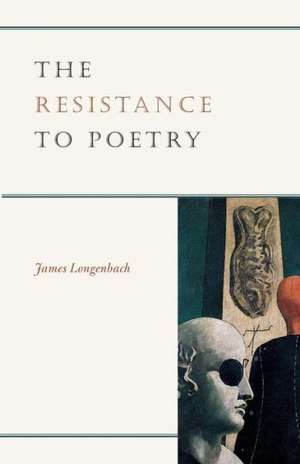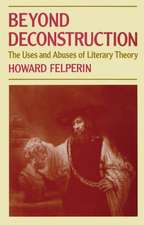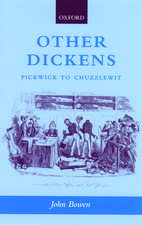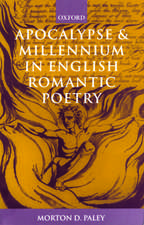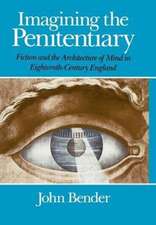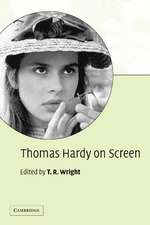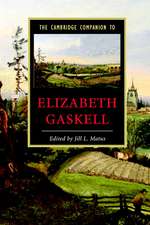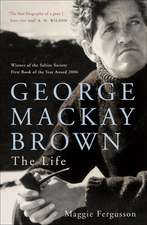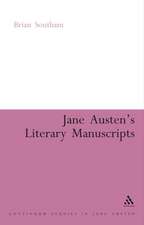The Resistance to Poetry
Autor James Longenbachen Limba Engleză Paperback – 21 noi 2005
Poems inspire our trust, argues James Longenbach in this bracing work, because they don't necessarily ask to be trusted. Theirs is the language of self-questioning—metaphors that turn against themselves, syntax that moves one way because it threatens to move another. Poems resist themselves more strenuously than they are resisted by the cultures receiving them.
But the resistance to poetry is quite specifically the wonder of poetry. Considering a wide array of poets, from Virgil and Milton to Dickinson and Glück, Longenbach suggests that poems convey knowledge only inasmuch as they refuse to be vehicles for the efficient transmission of knowledge. In fact, this self-resistance is the source of the reader's pleasure: we read poetry not to escape difficulty but to embrace it.
An astute writer and critic of poems, Longenbach makes his case through a sustained engagement with the language of poetry. Each chapter brings a fresh perspective to a crucial aspect of poetry (line, syntax, figurative language, voice, disjunction) and shows that the power of poetry depends less on meaning than on the way in which it means—on the temporal process we negotiate in the act of reading or writing a poem. Readers and writers who embrace that process, Longenbach asserts, inevitably recoil from the exaggeration of the cultural power of poetry in full awareness that to inflate a poem's claim on our attention is to weaken it.
A graceful and skilled study, The Resistance to Poetry honors poetry by allowing it to be what it is. This book arrives at a critical moment—at a time when many people are trying to mold and market poetry into something it is not.
But the resistance to poetry is quite specifically the wonder of poetry. Considering a wide array of poets, from Virgil and Milton to Dickinson and Glück, Longenbach suggests that poems convey knowledge only inasmuch as they refuse to be vehicles for the efficient transmission of knowledge. In fact, this self-resistance is the source of the reader's pleasure: we read poetry not to escape difficulty but to embrace it.
An astute writer and critic of poems, Longenbach makes his case through a sustained engagement with the language of poetry. Each chapter brings a fresh perspective to a crucial aspect of poetry (line, syntax, figurative language, voice, disjunction) and shows that the power of poetry depends less on meaning than on the way in which it means—on the temporal process we negotiate in the act of reading or writing a poem. Readers and writers who embrace that process, Longenbach asserts, inevitably recoil from the exaggeration of the cultural power of poetry in full awareness that to inflate a poem's claim on our attention is to weaken it.
A graceful and skilled study, The Resistance to Poetry honors poetry by allowing it to be what it is. This book arrives at a critical moment—at a time when many people are trying to mold and market poetry into something it is not.
Preț: 213.90 lei
Nou
Puncte Express: 321
Preț estimativ în valută:
40.94€ • 42.58$ • 33.79£
40.94€ • 42.58$ • 33.79£
Carte tipărită la comandă
Livrare economică 12-26 aprilie
Preluare comenzi: 021 569.72.76
Specificații
ISBN-13: 9780226492506
ISBN-10: 0226492508
Pagini: 144
Dimensiuni: 140 x 216 x 10 mm
Greutate: 0.17 kg
Editura: University of Chicago Press
Colecția University of Chicago Press
ISBN-10: 0226492508
Pagini: 144
Dimensiuni: 140 x 216 x 10 mm
Greutate: 0.17 kg
Editura: University of Chicago Press
Colecția University of Chicago Press
Notă biografică
James Longenbach is the Joseph Henry Gilmore Professor of English at the University of Rochester and the author of four distinguished critical studies of modern literature, most recently Modern Poetry after Modernism. His two books of poems, Threshold and Fleet River, are published by the University of Chicago Press.
Cuprins
Preface
I. The Resistance to Poetry
II. The End of the Line
III. Forms of Disjunction
IV. Song and Story
V. Untidy Activity
VI. The Spokenness of Poetry
VII. The Other Hand
VIII. Leaving Things Out
IX. Composed Wonder
Bibliography
Index
I. The Resistance to Poetry
II. The End of the Line
III. Forms of Disjunction
IV. Song and Story
V. Untidy Activity
VI. The Spokenness of Poetry
VII. The Other Hand
VIII. Leaving Things Out
IX. Composed Wonder
Bibliography
Index
